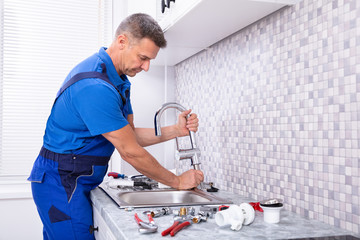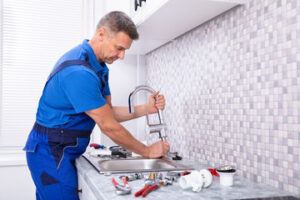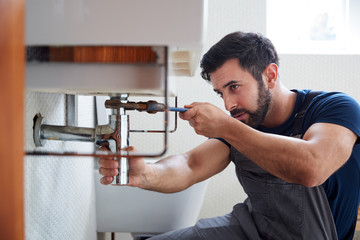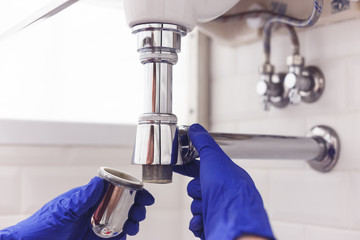Residential plumbers deal with the pipes inside homes. They make sure water and gas are flowing properly and help with plumbing remodels. They also ensure clogs don’t lead to flooding and other costly problems.

A residential plumber goes from house to house, fixing leaky toilets, clogged drains, and other issues. Commercial plumbers work on a larger scale and have to comply with different codes.
A residential plumber can install plumbing fixtures and appliances such as sinks, tubs, showers, toilets, dishwashers, water heaters, and more. They can also install piping for new construction projects like kitchens, bathrooms, and basements. When installing these systems, a plumber will need to follow city and state building codes as well as the National Plumbing Code. Plumbing is a trade that requires extensive training and experience. This is why most states require licensed professionals to perform plumbing services. Plumbers must complete a formal apprenticeship with a union or trade organization, earn a vocational degree from a college or technical school, or gain on-the-job experience with a master plumber.
Homeowners will likely encounter several plumbing issues throughout the year. These include leaky faucets, clogged drains, and water pressure problems. Some of these may be minor, while others can be more serious and lead to flooding, mold growth, or costly water damage. When these issues arise, it is crucial to call a plumber immediately. A licensed plumber will be able to diagnose and fix the problem quickly and efficiently to prevent further damage to your home or property.
When deciding on a plumber, you should always choose one with a good reputation in your community. Ask friends, family members, and neighbors for recommendations, and look for online reviews. Read over these reviews to see what other homeowners have experienced with the plumber you are considering. You can then use this information to help you make the best decision for your needs.
Residential plumbing can be quite complex compared to commercial plumbing. Commercial spaces have a lot more people using the plumbing system at any given time, so there is usually a higher demand for maintenance and repairs. Plumbers who specialize in commercial work can handle these demands more effectively.
Another difference between residential and commercial plumbing is that commercial spaces often require a permit to perform plumbing tasks. A plumber who works in a commercial space must meet certain requirements, such as specified work hours and having a license from the Department of Buildings.
Repair
In addition to installing new plumbing fixtures and appliances, residential plumbers also repair existing ones. They can fix leaky faucets, toilets that won’t stop running, and bathtubs that drain slowly or back up. To determine the cause of these problems, plumbers often use non-invasive diagnostic tools like water pressure tests and sewer line video cameras. Once they’ve identified the issue, they can make the necessary repairs quickly and efficiently.
When choosing a plumber, it’s important to find one with a good reputation in your community. Ask friends and family members for recommendations, and read online reviews to get an idea of what other customers have experienced. Choose a plumber who has years of experience and specializes in your type of plumbing issue. A reputable company will also charge competitive rates and provide quality work.
Unlike DIYers, professional plumbers have all the tools and equipment they need in their service vehicles. This means they can complete most jobs faster and more accurately than people who try to fix their own plumbing issues. In addition, professional plumbers are licensed and insured, so you can rest assured knowing your home or business is in safe hands.
There are many different types of plumbers, and each one has their own specialty. Some specialize in commercial systems, while others focus on residential systems. Some are even specialists in specific aspects of plumbing, such as sewer repair or water heater installation.
Residential plumbing includes working on pipes that carry both water and gas in homes. These systems are a vital part of your home and can be quite complex, so it’s important to have them maintained regularly. When you notice a problem, it’s best to call a professional right away so they can diagnose the issue and come up with a solution. The longer you wait to call a plumber, the more likely you are to have serious issues that require costly repairs. For example, a toilet that constantly runs can lead to massive water waste and high utility bills. It’s also a good idea to call a plumber for any leaky pipes, slow-draining showers, or smelly drains.
Maintenance
Many plumbing problems can be prevented with routine maintenance. Homeowners can help keep their plumbing systems in good working order by installing water filters, cleaning out drains regularly, and making sure to only flush toilet paper and human waste down the toilet. A professional plumber can also assist homeowners by inspecting their homes for clogged drain lines, water leaks, and other potential issues.
When hiring a residential plumber, it is important to consider their experience and work history. A successful plumber will have a solid understanding of all the necessary tools and techniques to get the job done quickly and correctly. They will also have a strong grasp of the industry’s latest technologies and trends.
While it may seem like any plumber can fix a leaky faucet or clogged drain, it is always best to choose a plumber who specializes in residential plumbing. These professionals have the training and tools to ensure that your plumbing system is running as smoothly as possible, which will save you both time and money in the long run.
Plumbing leaks can cause serious damage to your home if they are not repaired immediately. They can result in expensive repairs and higher utility bills. In addition, they can lead to unhealthy air quality in your home by causing mold and mildew. It is recommended to have your plumbing system inspected by a qualified plumber at least once a year to identify and repair any minor issues before they become major problems.
To be a successful residential plumber, you need to hif they are a high school diploma or equivalent and complete an apprenticeship program. This training combines paid on-the-job training with classroom instruction and gives you the skills you need to succeed as a residential plumber. You must also pass a state exam to become licensed as a plumbing contractor.
While it is not required to be a certified plumber to perform installation, repair, and maintenance services, certification can be beneficial for your career. Certified plumbers have passed additional tests and have years of experience in the field. In addition, they must be familiar with the local codes and regulations that govern their profession. It is also helpful for certified plumbers to have excellent critical thinking and problem-solving skills.
Replacement
Residential plumbers install new plumbing systems and piping for home additions, remodels, and new construction. They also replace existing fixtures and appliances like toilets, faucets, water heaters, and more. They’re skilled at inspecting and analyzing current plumbing in homes to determine the best solutions for repairs or upgrades.
Whether you’re facing an emergency situation or are simply looking to update your home’s plumbing, it’s important to find a plumber who offers 24/7 service. Leaking toilets, overflowing drains, and other problems can occur at any time, and you’ll want a plumber who is available to help when you need it most. A residential plumber with years of experience will be able to offer quick and trustworthy service. They’ll know how to spot potential issues before they become major problems, saving you money in the long run.




